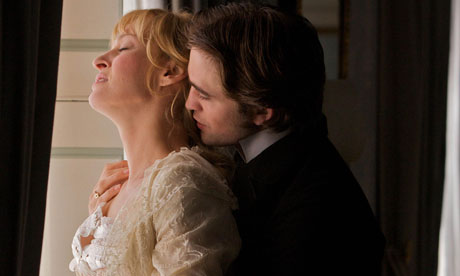
Journalism is a glamorous trade in Guy de Maupassant's Bel Ami, as Declan Donnellan and Nick Ormerod's film adaptation (released in the US next week and in the UK a week later) underlines by casting Robert Pattinson as Georges Duroy and Uma Thurman, Kristin Scott Thomas, Christina Ricci and Holly Grainger as women drawn to the rising Parisian reporter. As well as introducing him to them and assisting his progress as a social climber, working for La Vie Française gives him the power to manipulate or bring down ministers.
What he epitomises too, though, is a press that's sordid and shallow, advancing the personal ends of journalists and owners with no underlying ethical code. Writing talent and a lengthy building up of specialist knowledge aren't essential: Duroy owes both his scoops and the bite of his prose to Madeleine (Thurman), his passport to political circles and initially the real author of what appears under his byline.
Bel Ami belongs to a group of works written between 1880 and 1910 in which novelists take aim at journalists, who are portrayed as either vilely willing to stain reputations (Zola's Nana, Henry James's The Reverberator) or moral vacuums drawn into loathsome schemes (The Wings of the Dove). That this reflects antagonism between connected tribes is clearest in Balzac's earlier Lost Illusions, where the hero, Lucien Chardon, after arriving in Paris shuttles between the two worlds of book and newspaper publishing, writing for eternity and tomorrow.
One day he is a starving, celibate, unpublished poet, the next, as a venal paper's theatre critic, he has a guaranteed income and a mistress and is admitted to a dashing gang who party every night. What perhaps particularly irked the novelists, beyond their moral revulsion, is that these secret sharers who prostitute their writing have so much fun and exercise so much influence. "You're now about to become one of the hundred privileged persons who foist their opinions on the French public," Lucien is told. "You can make a man curse the day he was born. You can draw a regular income – in sensual pleasure – from all the actresses … Publishers will queue up outside your flat."
No such sense of glamour and unearned, misused power is present in most 20th-century fictional portrayals of the press, where hacks typically toil pointlessly and joylessly (from Nathanael West's Miss Lonelyhearts to Michael Frayn's Towards the End of the Morning). But reporters still tend to be satirised or viewed coldly, whether they're fools like Boot in Evelyn Waugh's Scoop or ethically compromised like Fowler in Graham Greene's The Quiet American.
From about 1970, however, they seem to join other victimised minorities in receiving deeper and more positive representation. Jerry Westerby, John le Carré's boozy reporter with a spying sideline, is a comic turn in Tinker Tailor Soldier Spy but is fully fleshed out when he returns as the protagonist of The Honourable Schoolboy. Annie Proulx's The Shipping News and Richard Ford's The Sportswriter are complex studies of men in crisis who happen to be hacks, with no hint of authorial scorn or mockery.
Sacharaissa Cripslock in Terry Pratchett's The Truth – an inverted All The President's Men in which investigative digging serves to preserve a leader in power – does admirable work. And in Stieg Larsson's Millennium trilogy, magazine editor Mikael Blomkvist has as much success at breaking stories and hearts as Georges Duroy, but instead of a self-seeking opportunist manages to be a feminist (one of his big exposés is about sex-trafficking), a popular team leader and righter of wrongs.

